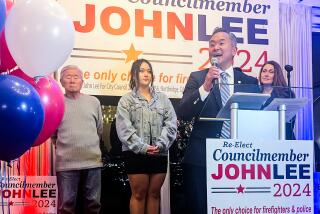Budget, Business Likely to Top Riordan List : Government: Already looking into privatizing LAX, the mayor-elect visits Sacramento to fight for city property tax revenue.
- Share via
Dealing with a budget crisis, privatizing the airport, streamlining regulations and shrinking City Hall bureaucracy are likely to be the top economic priorities of Mayor-elect Richard Riordan, who built his campaign in part on reviving the city’s moribund economy.
“I think that Richard Riordan as mayor of Los Angeles presents a wonderful opportunity for government . . . for the first time to take the leadership in private-sector development,” said lawyer Stan Sanders, a onetime mayoral candidate and member of Riordan’s transition team.
Riordan has yet to lay out formal proposals for the economy, other than to say he would like to ease regulations and make City Hall more business-friendly.
But he was not wasting any time getting started. Sanders said Riordan, elected Tuesday, has already begun looking into ways to find a private operator to run Los Angeles International Airport. Riordan said during the campaign that he favors such a move as a way of generating revenue to hire more police.
On Thursday, he set off for Sacramento to argue against shifting $300 million in property tax revenue from the city to finance state education.
And next week, Riordan, who sits on the board of RLA, plans to meet with the four co-chairs of the group to discuss where to go from here, co-chair Barry A. Sanders said.
Barry Sanders said RLA, formerly called Rebuild L.A., will probably now take its lead from Riordan and City Hall.
“We have always wanted to be, and have been, a complement to government initiatives,” he said. “What you have now is attention (in City Hall) focused specifically toward (economic development).”
During his campaign, Riordan promised a number of initiatives to change the perception that Los Angeles is a bad place to do business.
He said he would sell government bonds to provide capital to attract high-tech firms to the city.
He also promised to streamline the entire process of regulation: limiting the city council’s right to intervene in the process of issuing permits, placing a time limit on environmental impact reviews and other measures.
Some of these initiatives have been tried before. But “one interesting thing about Riordan is that he will be the first mayor who is not in alliance with the public employee unions and the bureaucracy, so that gives you some hope he may be able to deal with some of the unnecessary tangle,” said writer Joel Kotkin, a senior fellow at the Center for the New West, a Denver-based think tank.
Among Riordan’s top priorities for economic development are likely to be some kind of stimulus package to attract and keep small and medium-size businesses in Los Angeles, Stan Sanders said.
And he is likely to pay heed to the recommendations of a study group at the Reason Foundation, a public policy think tank. The study group is coming up with a raft of recommendations to guide the mayor in his first 100 days, under the direction of UCLA management professor William G. Ouchi, with whom Riordan has consulted in the past.
Lynn Scarlett, who is part of the study group, said the report will focus on a number of economic development issues: how to eliminate duplication by city departments in inspections and permitting, how to coordinate economic development and planning functions now residing in at least five city departments and other commissions, and how to reduce the effects of unwieldy city fees on new businesses.
On the stimulus side, Barry Sanders said that Riordan will be able to provide leadership on the further development of the airport, the Port of Los Angeles and the proposed Alameda Corridor project, which would create rail links between the port and downtown. Both the port and the airport are among the largest employers in the region and play a significant role in the city’s economic life.
Riordan can also play a role in lobbying the federal government to create special zones to stimulate investment in the inner city, Sanders said.
Linda Griego--a businesswoman, mayoral candidate and former deputy mayor for economic development--says Riordan will have the ability to make sure small businesses have access to city-managed loan programs using funds from the federal Small Business Administration and Economic Development Administration.
Moreover, she says, the city can go forward with contracting on public works projects for which bond money has already been approved, such as seismic upgrading of public buildings.
But not everyone believes that Riordan will be able to come up with much in the way of fiscal incentives.
“I don’t think he’ll have a huge amount of flexibility in providing goodies,” Kotkin said. “What he’s going to have to think more about is doing things more efficiently. . . . The best incentives he can give are increased security and speeded-up regulatory relief.”
And for now his job is clear, said Steven Erie, a professor of political science at UC San Diego who is writing a history of Los Angeles politics.
“The budget crisis will swamp everything else,” he said. “(It) drives a whole lot of other decisions.”
More to Read
Sign up for Essential California
The most important California stories and recommendations in your inbox every morning.
You may occasionally receive promotional content from the Los Angeles Times.










